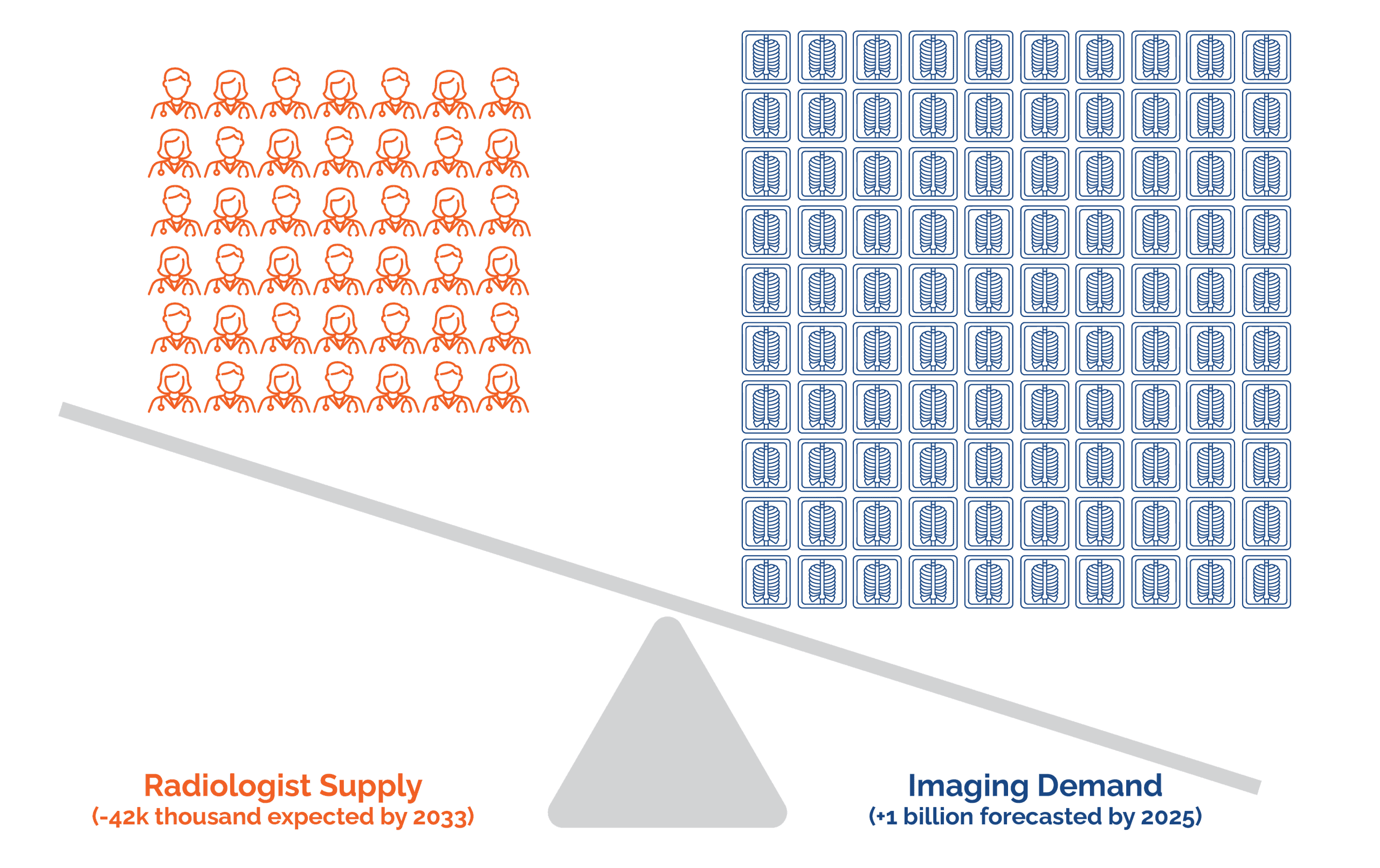Among even the most complicated physician specialties, Radiology tops the list for Revenue Cycle Management (RCM) complexity. High volumes are coupled with an extraordinarily complex CPT code set that covers every system in the body. This is a perfect storm that raises the stakes in nearly every aspect of Radiology RCM.
Here is just a sampling of the levels of complexity in Radiology RCM:
- Coding: Inexperienced RCM teams, or teams that are multitasking with other specialties, often struggle to master Radiology coding. With a high degree of repetition in Radiology billing, a single coding error could be repeated hundreds of times and result in thousands of dollars in missed revenue.
- Administrative Burden: Radiologists are near the top of the list of specialists most impacted by prior authorizations, which if not managed properly can lead to high rates of denials. Administrative hurdles such as these are particularly onerous on high-volume Radiology RCM teams.
- Staffing: Experienced Radiology RCM professionals are expensive to hire and train. Even veteran team members require ongoing training to stay current on payer policies and compliance regulations, which are continually changing, often with little advance communication.
Complicated RCM may feel like a double-edged sword when thinking about whether to maintain billing in-house or outsource to an RCM provider. On one side, Radiology practices may perceive that they have more control over the process when they can walk down the hall and collaborate with a staff member. On the other side, practices are challenged with staying fully and effectively staffed with professionals who can handle Radiology RCM.
The right RCM partnership is critical to success in a landscape riddled with roadblocks such as bad payer behavior, a debilitating radiologist shortage, and skyrocketing imaging workloads. These are the key things to consider when choosing the right approach.
Transparency and Collaboration
Open communication between providers and billers can significantly improve Radiology billing, whether the collaboration happens down the hall or during a video call. Radiology billing can no longer be a passive process of receiving reports and filing claims. RCM teams need open dialogue to probe for details that may clarify coding or for billable services that may have been missed. In turn, RCM teams can offer education and feedback to help providers improve their documentation to support appropriate reimbursement at the correct specificity.
Specialized Expertise
Because the Radiology CPT code set covers all systems in the body, coders need a broader knowledge of anatomy, as well as a thorough understanding of the multiple vantage points from which those systems are imaged. The field of Interventional Radiology, in which the radiologist uses imaging techniques to perform procedures, takes the complexity up a notch even further. Coders who work in this area may need additional training on the highly specialized procedures of the vascular system.
Additionally, Medicare billing guidelines, billing rules for remote reading, payer policies, and regulations for programs such as Medicare’s Merit-based Incentive Payment System (MIPS) are constantly changing. It takes dedicated resources to follow the changes, implement RCM strategies to mitigate the revenue impact, and educate physicians on how to remain in compliance.
Speed and Scalability
Imaging studies are expected to top 1 billion in 2025, while a shortage of up to 42,000 radiologists is expected by 2033 – smaller RCM teams may struggle to keep up with high volumes. If they fall behind, you can expect to see increases in billing errors such as missed services and views, incorrect CPT coding, and under-coded claims. Radiology billing teams have to be high-output and extremely efficient to ensure that volume increases don’t create opportunities for billing errors or missed revenue.

Data & Analytics
Amid reimbursement challenges, data & analytics have emerged as powerful tools to fine-tune Radiology billing services and the revenue cycle as a whole. By analyzing both benchmarking data and their own reimbursement data, practices can build effective strategies to improve profitability. A data-driven approach can proactively uncover and correct internal and external RCM issues that lead to claim denials, down-codes and underpayments, and other payment delays.
This type of analysis requires a robust platform, however. Attempting to analyze data manually is time-consuming, error-prone, and the results often arrive too late to be proactive.
Purpose-Built Billing Systems
A specialty-specific billing platform is essential for managing the nuances of billing Radiology. Whether in-house or outsourced, a billing and coding team should be using a billing platform built to handle the extensive CPT code set, to streamline charge capture, and to root out the sources of payment denials.
Financial Strength
Underlying each of the previous considerations is a key assumption: that sufficient resources exist to support a high level of service. This is where outsourcing begins to make sense for some practices.
In a recent survey, 60% of radiologists and other physicians said their staff are spending more time on billing compliance than they did five years ago. Outsourced Radiology-focused billing service providers are optimized to master the regulatory landscape and can manage changes in stride. They also benefit from economies of scale that keep huge volumes of claims moving swiftly through the system. Practices must ensure their Radiology billing teams have the financial resources to innovate and update technology, monitor key metrics and analytics, and continually refine workflows to manage volume, prevent denials, and improve reimbursement.
Partnering with Ventra Health for Radiology Billing Services
ADVOCATE RCM combined forces with Ventra Health in 2024 and is now known as the Ventra Health Radiology business unit. For more than 25 years, the Ventra Health Radiology team has focused exclusively on the complexities of Radiology RCM, honing the most sophisticated claims processing infrastructure available today. For every part of the revenue cycle, we have a custom-built process to identify and address revenue gaps. As a result, we deliver the lowest denial rates in the country.
Our commitment to high-touch, white-glove service gives clients the best of both experiences—the attention of an in-house RCM team with the resources of an outsourcing partner. Working as an extension of your practice, our Radiology RCM experts partner with you to increase billing efficiency, improve physician documentation, reduce audit challenges, and uncover issues that are negatively impacting your revenue.
Our teams leverage our proprietary Radiology billing software, along with AIMS, our powerful data & analytics platform, to provide exceptional coding accuracy and actionable data insights. We also created a Performance Surveillance Team to focus solely on daily monitoring of more than 200 audit controls, watching for issues that may impact performance and working cross-departmentally to address them proactively.
The right outsourcing partner can be a practice’s most important strategic ally. The increased revenue achieved with specialized expertise and dedicated attention will help Radiology practices of all sizes thrive under even the most challenging reimbursement conditions. Speak with our team of Radiology RCM professionals for a customized review of our we can support your goals of more accurate coding, successful billing, and accurate reimbursement.
